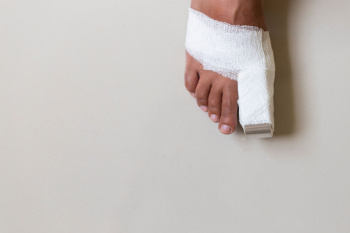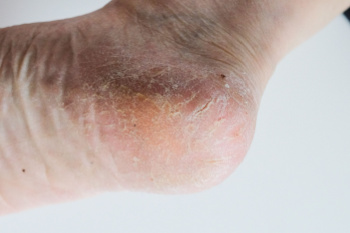
Wilmington (937) 382-2347
Fax
(513) 932-1606

Wilmington (937) 382-2347
Fax
(513) 932-1606

Toe pain can signal an underlying issue with how blood flows to and from the lower extremities. Because the toes are farthest from the heart, they are often affected first when circulation becomes compromised. Signs of poor circulation include coldness, color changes such as pale, bluish, or reddish tones, or swelling that worsens throughout the day. Some people notice numbness, tingling, or even pain during walking that subsides with rest, which can indicate restricted blood flow. Discoloration or thickened toenails, especially when accompanied by slow healing of minor cuts or sores, may also suggest poor circulation. People with diabetes are especially vulnerable, as nerve damage and vascular disease can reduce blood supply and increase the risk of infections or tissue damage. A podiatrist can conduct a thorough examination and order diagnostic testing to determine the cause. Treatment may involve medication, circulation assessments, or surgery, in more severe cases. If you are experiencing toe pain, it is suggested that you schedule an appointment with a podiatrist for a diagnosis and appropriate treatment.
While poor circulation itself isn’t a condition; it is a symptom of another underlying health condition you may have. If you have any concerns with poor circulation in your feet contact Dr. Gerald Perelman of Ohio. Our doctor will treat your foot and ankle needs.
Poor Circulation in the Feet
Peripheral artery disease (PAD) can potentially lead to poor circulation in the lower extremities. PAD is a condition that causes the blood vessels and arteries to narrow. In a linked condition called atherosclerosis, the arteries stiffen up due to a buildup of plaque in the arteries and blood vessels. These two conditions can cause a decrease in the amount of blood that flows to your extremities, therefore resulting in pain.
Symptoms
Some of the most common symptoms of poor circulation are:
Treatment for poor circulation often depends on the underlying condition that causes it. Methods for treatment may include insulin for diabetes, special exercise programs, surgery for varicose veins, or compression socks for swollen legs.
As always, see a podiatrist as he or she will assist in finding a regimen that suits you. A podiatrist can also prescribe you any needed medication.
If you have any questions, please feel free to contact our office located in Wilmington, OH . We offer the newest diagnostic and treatment technologies for all your foot care needs.

Children can experience several foot conditions as they grow, some of which are part of normal development while others may require medical attention. Hypermobile flat feet are often flexible and painless, typically improving with age. In-toeing, where the feet turn inward, and out-toeing, where they point outward, are common gait variations seen in young children and usually resolve without treatment. High arches, or pes cavus, may indicate a neurological issue if accompanied by pain or imbalance. Additionally, clubfoot is a more serious condition present at birth, where the foot appears twisted out of position and requires early intervention. Observing your child’s foot shape, walking pattern, and comfort level is important. If your child exhibits any of the above foot conditions, it is suggested that you contact a podiatrist who can monitor your child's foot health.
Making sure that your children maintain good foot health is very important as they grow. If you have any questions, contact Dr. Gerald Perelman of Ohio. Our doctor can provide the care you need to keep you pain-free and on your feet.
Keeping Children's Feet Healthy
Having healthy feet during childhood can help prevent medical problems later in life, namely in the back and legs. As children grow, their feet require different types of care. Here are some things to consider...
Although babies do not walk yet, it is still very important to take care of their feet.
Avoid putting tight shoes or socks on his or her feet.
Allow the baby to stretch and kick his or her feet to feel comfortable.
As a toddler, kids are now on the move and begin to develop differently. At this age, toddlers are getting a feel for walking, so don’t be alarmed if your toddler is unsteady or ‘walks funny’.
As your child gets older, it is important to teach them how to take care of their feet.
Show them proper hygiene to prevent infections such as fungus.
Be watchful for any pain or injury.
Have all injuries checked by a doctor as soon as possible.
Comfortable, protective shoes should always be worn, especially at play.
If you have any questions please feel free to contact our office located in Wilmington, OH . We offer the newest diagnostic and treatment technologies for all your foot and ankle needs.

A broken toe can be painful and may limit movement in the foot or ankle, especially if left untreated. While some toe fractures may seem minor, many require medical attention to prevent complications. Common signs include swelling, bruising, pain when walking, and changes in toe alignment. A podiatrist can evaluate the broken toe through a physical exam and imaging tests to determine the type of fracture and what treatment is needed. Minor breaks may be stabilized with buddy taping, which involves taping the broken toe to a neighboring one. More severe fractures, such as displaced or complex breaks, might require a cast or walking boot to keep the toe straight during healing. In some cases, surgery is required to reposition the bones or insert pins that help maintain proper alignment. Healing can take up to two months, and returning to activity too soon can increase the risk of reinjury. A podiatrist can monitor the healing process and address complications, such as long-term pain or joint damage. If you have broken a toe, it is suggested that you schedule an appointment with a podiatrist for an exam and treatment.
A broken toe can be very painful and lead to complications if not properly fixed. If you have any concerns about your feet, contact Dr. Gerald Perelman from Ohio. Our doctor will treat your foot and ankle needs.
What to Know About a Broken Toe
Although most people try to avoid foot trauma such as banging, stubbing, or dropping heavy objects on their feet, the unfortunate fact is that it is a common occurrence. Given the fact that toes are positioned in front of the feet, they typically sustain the brunt of such trauma. When trauma occurs to a toe, the result can be a painful break (fracture).
Symptoms of a Broken Toe
Generally, it is best to stay off of the injured toe with the affected foot elevated.
Severe toe fractures may be treated with a splint, cast, and in some cases, minor surgery. Due to its position and the pressure it endures with daily activity, future complications can occur if the big toe is not properly treated.
If you have any questions please feel free to contact our office located in Wilmington, OH . We offer the newest diagnostic and treatment technologies for all your foot and ankle needs.

Dry skin on the feet and cracked heels can be uncomfortable and sometimes painful. Lack of moisture is a common cause, as the feet have fewer oil glands compared to other parts of the body. Standing for long periods, wearing open-backed shoes, and walking barefoot can increase the risk of dryness and thickened skin. Risk factors include aging, obesity, and prolonged exposure to harsh weather conditions. Certain medical conditions, such as diabetes, eczema, and thyroid disorders, can also contribute to excessive dryness and cracking. If left untreated, deep cracks may develop, increasing the risk of infection. If you have cracked heels, it is suggested that you consult a podiatrist who can treat this uncomfortable condition, which may include prescribed medication.
Cracked heels are unsightly and can cause further damage to your shoes and feet. If you have any concerns, contact Dr. Gerald Perelman from Ohio. Our doctor can provide the care you need to keep you pain-free and on your feet.
Cracked Heels
Cracked heels appear unappealing and can make it harder for you walk around in sandals. Aside from looking unpleasant, cracked heels can also tear stockings, socks, and wear out your shoes. There are several methods to help restore a cracked heel and prevent further damage.
How Do You Get Them?
Dry skin is the number one culprit in creating cracked heels. Many athletes, walkers, joggers, and even swimmers suffer from cracked heels. Age and skin oil production play a role to getting cracked heels as well.
Promote Healing
Over the counter medicines can help, especially for those that need instant relief or who suffer from chronic dry feet.
Wear Socks – Wearing socks with medicated creams helps lock in moisture.
Moisturizers – Applying both day and night will help alleviate dryness which causes cracking.
Pumice Stones – These exfoliate and remove dead skin, which allows for smoother moisturizer application and better absorption into the skin.
Change in Diet
Eating healthy with a well-balanced diet will give the skin a fresh and radiant look. Your body responds to the kinds of food you ingest. Omega-3 fatty acids and zinc supplements can also revitalize skin tissue.
Most importantly, seek professional help if unsure how to proceed in treating cracked heels. A podiatrist will help you with any questions or information needed.
If you have any questions, please feel free to contact our office located in Wilmington, OH . We offer the newest diagnostic and treatment technologies for all your foot care needs.